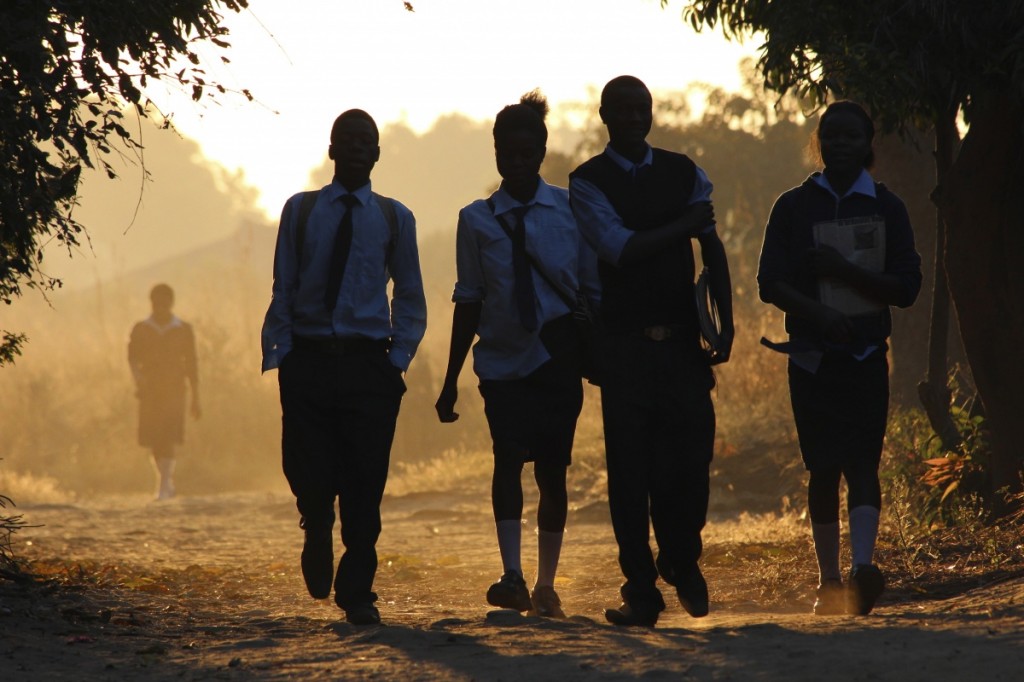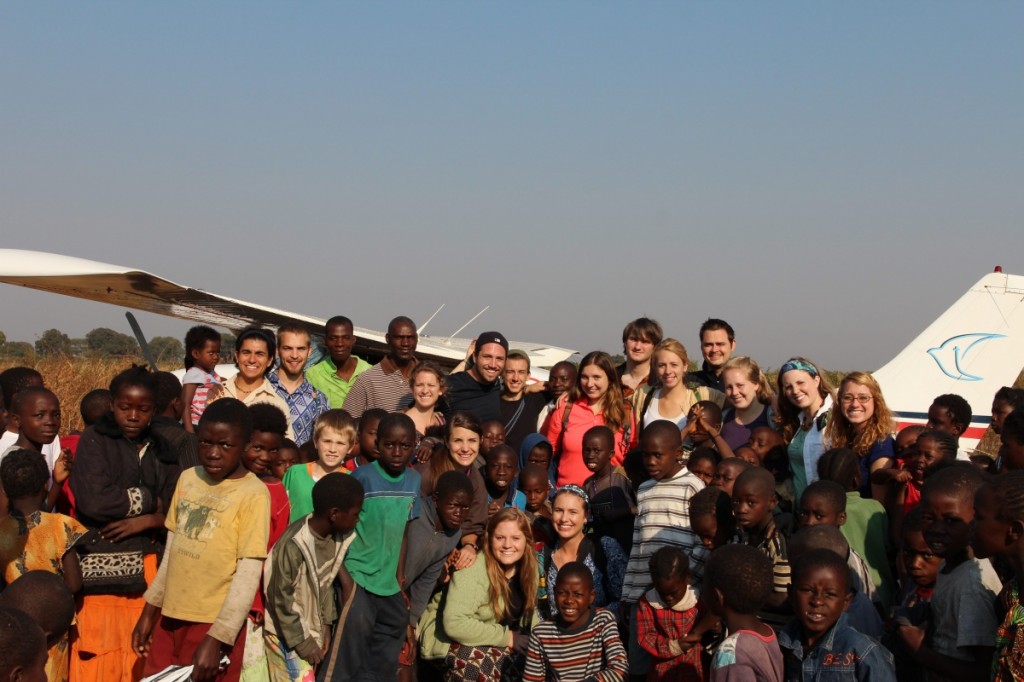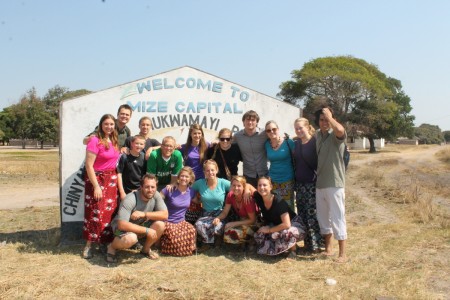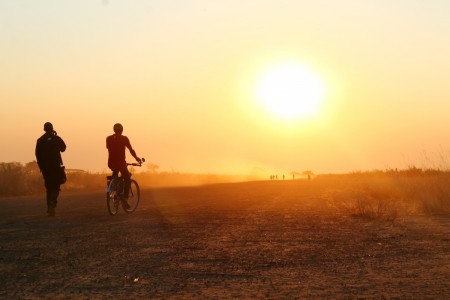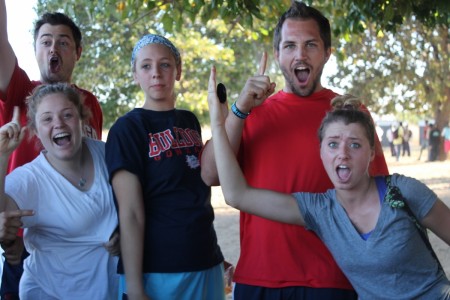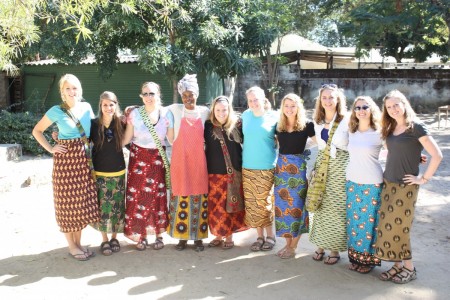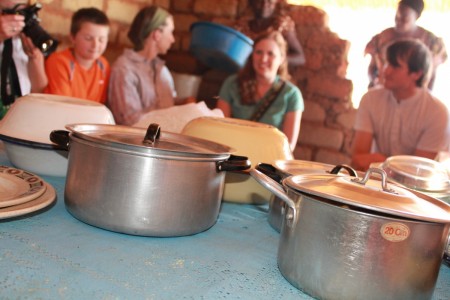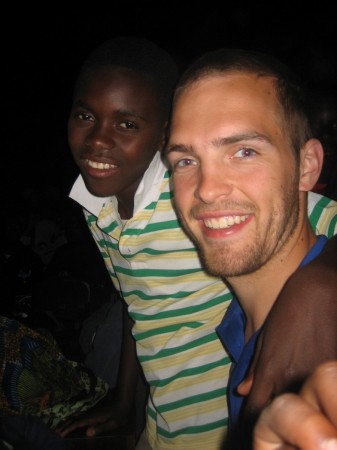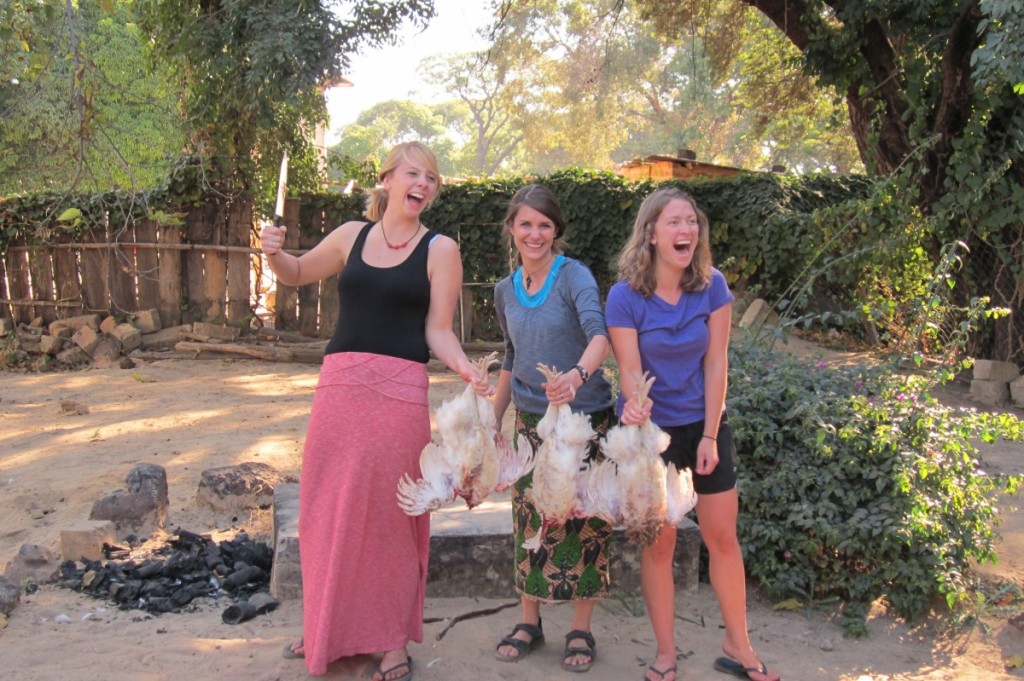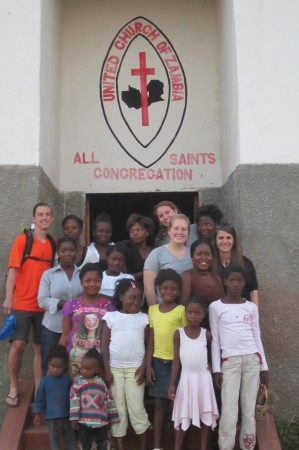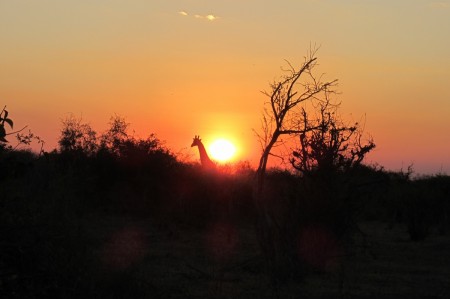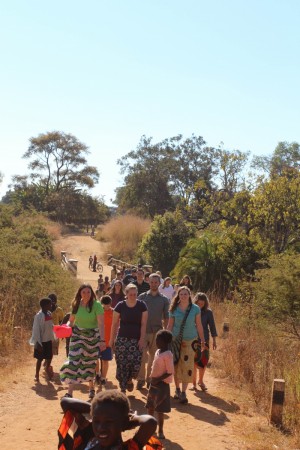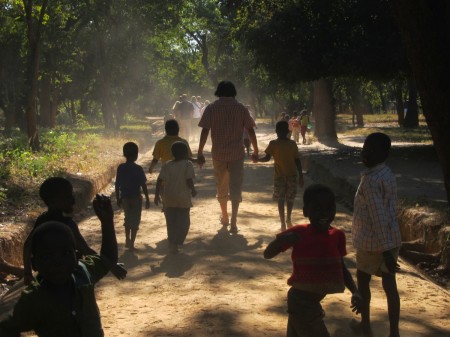In his poem “The Road Not Taken,” legendary poet Robert Frost wrote, “Two roads diverged in a wood, and I, I took the one less traveled by, and that has made all the difference.” My road to Zambia started two years ago with choosing to write my doctoral dissertation in Gonzaga University’s Doctoral Program in Leadership Studies on the essence and emergence of servant leadership associated with students’ lived experiences in the Gonzaga-in Zambezi Program, which I titled, “From Zambia With Love: Enacting Eye-Level Servant Leadership.” After researching, conducting interviews, analyzing the data, and writing 371 pages, I graduated with a Ph.D. in Leadership Studies from Gonzaga University about a month ago with the amazing support of my loving family, friends, and a flock of screaming rubber chickens. This road has led me all the way to Zambia, over 12,000 miles from my hometown of Soldotna, Alaska. While I have experienced this tremendous program in Zambia through the voices of my research participants and my own writing for quite some time, it has been wonderful to have my own experiences here with a truly remarkable group of Gonzaga University students.
What I have discovered on my journey is that “the road less traveled” in Zambia is filled with many paradoxes. It has been disorienting, confusing, heart-breaking, and simultaneously incredibly full of grace, freedom, joy, wholeness, and life. From being overwhelmed with joy as all of us chanted “Go Gonzaga, G-O-N-Z-A-G-A,” while being baptized in the mighty waters of Victoria Falls – one of the seven natural wonders of the world – to seeing a monkey sneakily steal my sugar packet from the Royal Livingstone Hotel during “High Tea,” to seeing a pride of lions lazily enjoying the morning sunlight in Chobe National Park in Botswana, to flying in the co-pilot seat of a 6-seat bush plane and being greeted by hundreds of excited Zambians singing and dancing, to having an impromptu BYOHL dance party (bring-your-own-head-lamp, because the power went out again!) with multitudes of Zambian children singing Shakira’s “Waka Waka” (“This Time for Africa”), to scoring the first goal in a pick-up soccer game with a bunch of amazing soccer players and screaming “Wele!” (GOAAAAL!) at the top of my lungs and giving high-fives to all of my little teammates. There is so much joy and so much abundant life here. We have been and are being continually transformed by the connection, love, and joy of the people here.
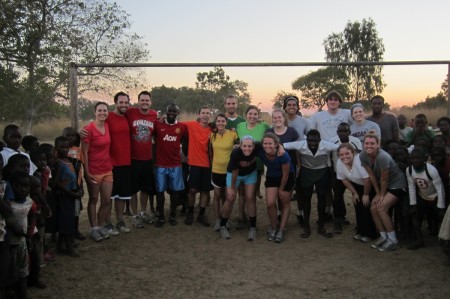
Team Chindele after a 2-1 non-victory versus Chilena Basic School
“The road less traveled” in Zambia has also been filled with pain and perseverance. People have told us, quite bluntly, that they are suffering. We have seen it with our own eyes. We have felt it. Many of the children don’t wear shoes and wear the same dirty clothes full of holes every day. We have been to the hole in the ground where the women obtain their water and carry it on their heads, often long distances, back to their mud huts with grass roofing. Many people don’t have enough to eat. There is the pain of incessant illness, unemployment, death, and disease, in a country where approximately 1 in 6 people have HIV, while others face malaria and tuberculosis. And there is the pain from the Western world turning its back on Africa. I recently had a powerful experience with Alex, as we tried to locate a very sick man named Maxwell who desperately needed to receive treatment at the hospital. We drove into the far reaches of Zambezi with Winifreda, the organizer of the Home Based Care program in Zambezi, but we could not find Maxwell. We finally found him at the Zambezi Hospital, crumpled on the ground wearing an old tweed coat, looking exhausted and scared after biking a very long distance over sandy roads to get there. Because Maxwell could not walk under his own strength, Alex and I physically supported him, taking slow steps to his bed situated in a room full of other patients. During the time that it took for the hospital staff to get his bed linens ready, I just rubbed Maxwell’s back as he hunched over the bed continuously coughing, barely able to stand. As Alex and I lifted Maxwell’s very frail body into the hospital bed, the weight of the situation overwhelmed me. Maxwell died a few days later of HIV and pneumonia. I saw some men carrying a simple but colorful wooden casket near the hospital the other day. I wonder if it was his. I knew we couldn’t heal him, but perhaps he in some way he has healed me. It is my hope that he felt love from us during his last few days. Sometimes all you can do is be fully present, show love, and honor another person’s full humanity in their darkest hours.
“The road less traveled” in Zambia has been a road filled with music that is situated at the intersection where heaven meets the Earth. The music during the 2 ½ hour Masses is phenomenal – I can’t get enough. I find often myself on the verge of tears because the voices praising God in unison, often in languages I don’t understand, stir something in my heart – connecting me to the transcendent in powerful and meaningful ways. Singing and dancing are an integral part of the Zambian culture, and I love it. Finally all of my hip thrusting and gyrations that are often my go-to dance moves in the United States are socially acceptable! I also often play guitar outside of the convent to many of the younger children and we sing songs like “Chew My Gum With God” “A la la la” (Alleluia), “Radical God,” “Blessed Be,” “I just Wanna Be a Sheep” and the “Hippo Song,” just to name a few. It seems that everywhere I go, the children ask me two questions (after of course yelling “Chindele!” at the top of their lungs and repeatedly saying “How are you?”): 1) “Where’s your chicken?” (I brought a screaming rubber chicken that both horrifies and delights the children); and 2) “Where’s your banjo?” There is nothing more fun than jumping around playing my “banjo” with all of the little children jumping around me singing and laughing. I’ve also been teaching guitar lessons to some of the children and one of the priests-in-training, Brother Gregory. It’s also been fun to create silly songs on the spot for the children…it’s amazing how many words rhyme with Zambezi – crazy, lazy, hazy, daisy, corn maize, and of course Patrick Swayze.
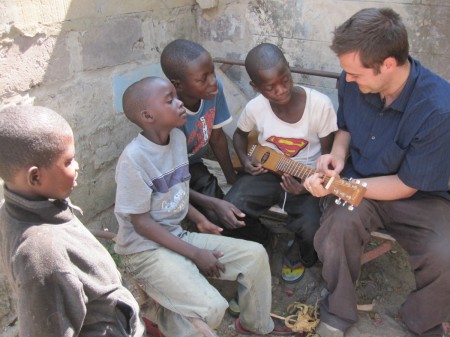
Dave teaching guitar lessons to kids in Zambezi
“The road less traveled” in Zambia has been incredibly humbling and has given me something new to add to my resume: “African Bush Driver.” On the other side of the world, I have found myself courageously driving on the other side of the road…places my Geo Prism can only dream about. I have been humbled every step of the way, stalling in front of large audiences of onlookers, constantly turning on the windshield wipers instead of my blinker, dodging between pigs and goats crossing the road while I lay on the horn with bicyclists and people walking on both sides of the road and down the middle of the road, hitting enormous potholes that only Spokane could be proud of, giving students in the back of the Land Cruiser more air than LeBron James (all while shouting “Minone!”)…not to mention that this is all being done from the left side of the road, often in fairly deep sand. The good news is that driving in sand feels very similar to driving in snow. This has earned me the nickname Dave “Smooth Ride” Houglum.
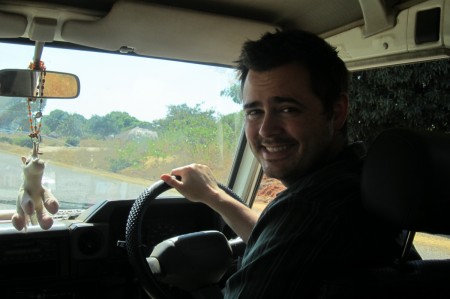
Bus Driva Dave
These mad skills came into play when I was recently appointed the “Bus Driva” for the health education team of Gonzaga students and a team of Home Based Care volunteers from the Catholic Church in Zambezi. We visited six rural villages containing people whom the Home Based Caregivers rarely see without transportation – We delivered food, encouragement, clothes, and companionship. Each of these people we visited had HIV and differing levels of health challenges. One particular married couple that we visited deeply impacted me. While sitting outside their simple mud hut on little wooden stools about a foot off of the ground, they shared with us (through an interpreter) about their life, their happy marriage, their children, and their health issues (both were HIV-positive). At one point, they both erupted into singing and dancing because they were so happy that we had visited them. Both of them told us how hungry they were and that they didn’t have enough money for food or for blankets to keep them warm (it’s surprisingly cold here at night). The husband and wife duo then did something remarkable – they gave us some of the only food they had: five pumpkins. It is very hard to express the unbelievable amount of joy they possessed in giving these gifts to us, and the amount of overwhelming humility we felt in receiving these incredible gifts of hospitality and love.
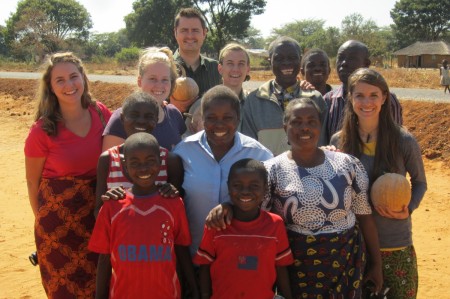
Health Education and Home Based Care Team Receiving an Amazing Gift of Hospitality
Additionally, I have been humbled by the children who wait for me outside of the convent who have made me their special friend while I am here. They slip their little hands into mine and with their bare feet walk with me throughout the sandy streets of Zambezi, helping me navigate where I want to go. While we are not able to communicate much through spoken language, the non-verbal communication through gestures and smiles and the physical manifestation of accompaniment through our interlocked hands is more than humbling.
Being rooted in Ignatian pedagogy and spirituality, we have been intentional about reflecting on our experiences, seeing God in all things, and learning what it truly means to be men and women for and with others – on this road filled with joy, pain, music, and humility. They are paradoxically all a part of the same road we have all been travelling. We are all being liberated in this authentic encounter with the “Beloved Other” as we have learned to serve and be served where we are, see others at eye-level, and love those we lead. A quote that encapsulates the essence of this experience comes from David Diggs’ work, “We See from Where We Stand”: “If you have come to help me you are wasting your time. But if you have come because your liberation is bound up with mine, then let us work together.” We have found that our liberation is indeed bound up with the people here in Zambia. Martin Luther King, Jr. eloquently echoed this: “In a real sense, all life is interrelated. All men [and women] are caught up in an inescapable network of mutuality, tied in a single garment of destiny. Whatever affects one directly affects all indirectly. I can never be what I ought to be until you are what you ought to be, and you can never be what you ought to be until I am what I ought to be. This is the interrelated structure of reality.”
We have wrestled with some of the most challenging and perplexing questions facing humanity and come away from this experience not with easy answers, but perhaps more willing to embrace and continue to delve into the mysteries and paradoxes of the human condition. We find ourselves living the questions now in hopes that the answers will come in time. As the poet Rainer Maria Rilke stated, “Have patience with everything unresolved in your heart and to try to love the questions themselves…Don’t search for the answers, which could not be given to you now, because you would not be able to live them. And the point is, to live everything. Live the questions now. Perhaps then, someday far in the future, you will gradually, without even noticing it, live your way into the answer.”
I am incredibly thankful for the opportunity to help lead this group with Josh, Melissa, and Nolan. I am incredibly grateful to the Comprehensive Leadership Program, the professors of the Doctoral Program in Leadership Studies at Gonzaga University, my research participants, the students here who have been some of the finest Gonzaga University students I have ever worked with, my family, and the people of Zambia for opening their homes, lives, and hearts, and for loving us into a new way of thinking, being, and acting. It was my hope to give you a glimpse from “the road less traveled” here in Zambia. May you too embark on “the road less traveled,” for it makes all the difference.
Kisu Mwane,
Dave Houglum, Ph.D. Class of 2012

